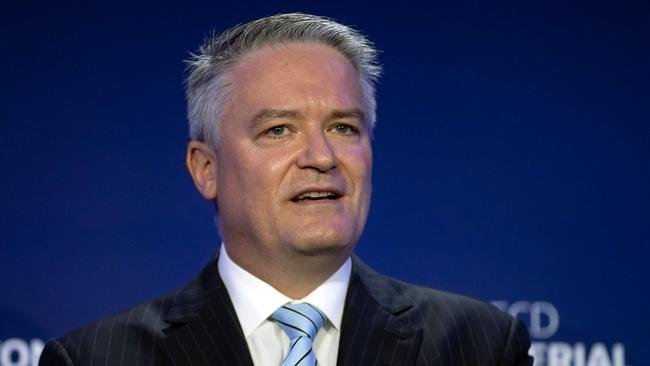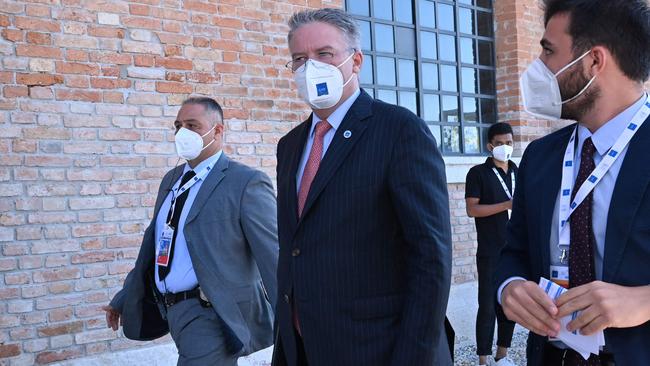Vaccine rollout key to economic recovery says OECD chief Mathias Cormann
Global economic recovery faces ‘serious downside risks’ from any new outbreaks of more lethal Covid-19 variants, OECD secretary-general Mathias Cormann has warned.

The world economic recovery faces “serious downside risks” from any new outbreaks of more lethal Covid-19 variants, OECD secretary-general Mathias Cormann has warned.
In an exclusive interview with the Australian from the G20 meeting in Venice on the weekend, the former federal finance minister said the most important economic priority at the moment was to accelerate the rollout of the vaccine.
“Economic policy priority number one, two and three remains to vaccinate as many people all around the world as possible, as quickly as possible,” he said.
“The concern remains that new variants of the virus will create more lethal waves of infections, with a new wave of economic hardship.”
The OECD’s official forecast is for global economic growth to increase to 5.8 per cent this year, a more upbeat scenario than the 4.2 per cent projected by the organisation last December.
But the latest outbreak of the Delta strain of the Covid virus is now generating new concerns for economic policymakers.
“The (economic) outlook continues to improve, though it remains uneven and serious downside risks remain,” Mr Cormann said.
“This is the fastest growth in almost 50 years, yet it will only bring back global output to 2019 levels,” he added.
“The recovery also remains uneven across countries and across sectors.
“The main downside risk remains further outbreaks of the coronavirus pandemic – particularly with new variants of the virus that may be resistant to existing vaccines.”
He said developed countries had a responsibility to do more to help developing countries vaccinate their people as quickly as possible.
Mr Cormann’s comments come as Sydney battles an outbreak of the more virulent Delta variant of Covid, forcing Australia’s largest city into an extended lockdown which is harming small businesses.
The Belgian-born former politician from Perth took over as secretary-general of the OECD in Paris on June 1.
He was immediately involved in OECD-sponsored negotiations for a new global tax agreement that set a minimum 15 per cent corporate tax rate and forced digital giants such as Apple, Google and Facebook pay more tax.
There was also an agreement to make multinationals pay tax in the markets where they sold their products, even if they did not have a physical presence there.
Mr Cormann described the agreement between some 130 countries, reached two weeks ago in Paris, as “a major multilateral achievement and the most significant update to international tax rules for many decades”.

He said the agreement, which was discussed by G20 finance ministers in Venice at the weekend and will be further discussed by G20 leaders in Italy in October, would make multinational businesses generating profits in Australia, particularly digital businesses, pay a “fairer share of tax.”
He said the deal would lead to more revenue for governments around the world, including Australia.
Mr Cormann said the reform would also make the international tax arrangements “more certain, more stable, more effective and more equitable”.
He said the approach of the Biden administration, which had been backing plans for a global minimum tax rate – a shift from the Trump administration – was a “game changer” which helped give momentum to the negotiations.
“We now have 132 countries and jurisdictions representing more than 90 per cent of global GDP backing this deal,” he said.
Mr Cormann said the agreement, which the parties hope to come into operation in 2023, would need to be translated into domestic legislation in countries around the world.
He said he was “quietly optimistic that we will ultimately get there”.
Mr Cormann said the multinational tax system was “clearly in need of further reform”.
“Too many multinational companies were able to pay very little or no tax on a significant portion of their global profits,” he said.
He said the combined effect of the globalisation and digitisation of world economies “created significant distortions, inefficiencies and inequities in our global tax arrangements”.
He said national governments needed to be able to raise the necessary revenue to fund their essential public services “in a way that is efficient, least distorting and fair”.
Mr Cormann said the OECD had a “good track record” in helping to prevent multinational tax avoidance.
“First with its 2015 plan against base erosion and profit shifting, and now with the two pillar reform of our international tax framework, designed to ensure that multinationals pay their fair share of tax in the right places at the right time,” he said.
Mr Cormann said he had begun work on the negotiations as soon as he started the job at the OECD headquarters in Paris.
“Within two days of starting in the job, I was on a train to London for the G7 finance ministers’ conference where we reached the historic agreement which generated much needed momentum for this reform,” he said.
“I was literally on the phone and on WhatsApp to prime ministers and finance ministers around the world from that time onwards until the final deal with the 130 countries was signed on July 1.”
Mr Cormann rejected suggestions that there was a swing away from globalisation as a result of lockdowns and closures in the wake of the pandemic.
“Globalisation is here to stay,” he said.
“It is not as if anyone can switch off progress.
“Any country that chooses to protect itself from competitive pressures, innovation and progress will stop that innovation and progress in its own country but won’t stop it happening elsewhere.”
He said a key lesson of history, particularly after World War II, was that the country that sought to “protect” itself would fall further behind.
“Global competition at its best is a powerful engine for progress, innovation and an improvement in living standards,” he said.








To join the conversation, please log in. Don't have an account? Register
Join the conversation, you are commenting as Logout